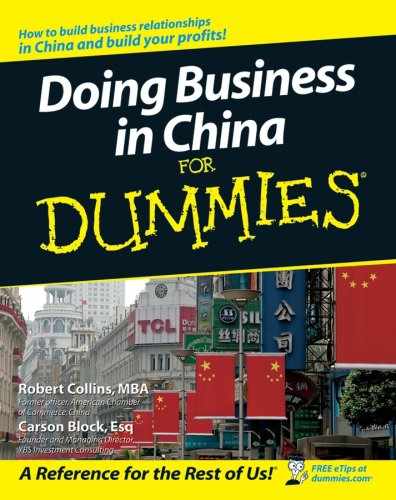Being Aware of Common Planning Mistakes
Several mistakes are common to first-time investors in China. Try to keep this section in mind during your planning. When you’ve almost finished your plan, you may want to reread this section to see whether you’ve possibly committed one or more of these errors.
Overestimating revenue
Over-optimism is the biggest mistake that foreign investors make when planning for China. Assumptions tend to be a bit optimistic because consultants and soon-to-be China managers have an interest in selling the project. Some companies looking to sell to China are naïve enough to think that China is a market of 1.3 billion consumers. Hopefully, your company understands that only a small percentage of Chinese people have disposable income. Companies also commonly overestimate sales because they don’t fully account for distribution difficulties, competitive onslaught, and consumers’ purchasing power.
Underestimating costs
Companies tend to experience higher operating costs than they expect. For one, China is a more expensive place to do business than you’re used to. Another issue is that China has a number of hidden costs, such as employee turnover, utility shortages, and supply bottlenecks.
Another reason companies underestimate costs is that they assume timelines for getting off the ground that aren’t realistic. If you’re manufacturing in China, for instance, expect that your per-unit costs will be the same as in the West for your first two or three years of operations.

Rushing the process
If you feel beholden to a timeline, you’re bound to make mistakes. “Good things come to those who wait” is doubly true in China. Don’t look for shortcuts and ways to cut corners. Common examples of such shortcuts include doing a joint venture when you have reservations about the partner just because you want to get things moving. It’s also common to screw up in negotiations because your team has flown thousands of miles for a negotiation and there’s pressure to make the trip seem worthwhile. When something comes up in the meetings, your team may gloss over it, deciding that it can be worked out later, in order to move closer to signing. Build plenty of extra time into your schedule.
Not accounting for the X-factor
In a literal sense, you can’t plan for the unknowable. But you should know that the unknowable will happen to your company and that you normally won’t be pleased. You shouldn’t operate the company so close to the bone that it can’t withstand the X-factor. Moreover, you should have contingency plans in place for various emergencies.
Throughout the book, you can read about a number of companies that got hit by the X-factor in one form or another. Don’t take their stories too much to heart, though, or you’ll find yourself preparing to fight the previous war. However, one event that should be in your contingency plans is a major health epidemic, such as SARS or the bird flu. Have a plan in place in case of a sudden outbreak where nobody shows up to work. You may also want to educate your workers on public health issues and push them to get flu vaccines yearly.
Mistaking Chinese language for China
Short-sighted firms believe that if they hire someone with Chinese language skills back at headquarters, he or she will be the right fit to work with the China business — either from headquarters or in China. Too often, Western companies think that language skills are the key to unlocking the Chinese market. Unfortunately, this method isn’t the way to go about it. Doing business in China involves more than speaking Chinese.
We thought they wanted to workOne company was in negotiations to purchase a Chinese-owned company. The Chinese company’s payroll was a bit bloated. Part of the negotiations dealt with whether the buyers could lay off some employees. The sellers agreed to layoffs, provided that the buyers paid severance and guaranteed the pension obligations to those workers. This provision seemed fair enough, and the sale of the company went through. Shortly after the workers found out that some workers were going to be let go with severance and a guaranteed pension, the remaining workers immediately went on strike. They wanted to get laid off, too! |
Hire people for their business skills. Interpreters and translators (see Chapter 2) can help your team deal with any language issues.

Losing sight of what you know
Throughout all phases of doing business in China, you should remember that you already know a lot about your own business. Language barriers, overzealous consultants, job applicants, and widely reported incidents of Western companies meeting with business disaster can easily intimidate you into thinking that you don’t know what you’re doing in China.
You know a lot more than you may realize. Good business practices are good business practices. They can be transferred. Odds are that many aspects of your business model can be transferred, too, but don’t take this advice as a license to be stubborn or arrogant. You’re going to need to be flexible in some areas. We’re just trying to give you some backbone to stand up to the (often self-interested) people who’re inevitably going to try to convince you that you don’t know what you’re doing.
As a general rule, your internal management practices — particularly your corporate culture — are mostly applicable in China (see Chapter 9). If you’re going to make adjustments, they’re most likely going to be made to marketing and distribution models.

Your respect for ethics and legal compliance is 100 percent applicable in China. Never compromise these principles in the belief that you have to play by special rules in China. Some of your Chinese competitors may play by different rules, but an FIE should never do so. Make sure part of the culture you instill reflects your company’s ethical practices. See Chapter 17 for safeguarding against some compliance-related risks.

